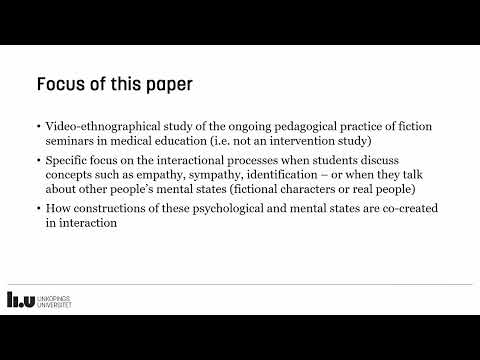 Speaker: Anja Rydén Gramner @anjagramner
Speaker: Anja Rydén Gramner @anjagramner
 Affiliation: Linköping University
Affiliation: Linköping University
Title: Constructions of empathy as a professional skill in medical education fiction seminars
Abstract: We explore the significance of narratives in medical education, focusing on quantitative and qualitative research that highlights the impact of narratives on empathy training, end-of-life care situations, and moral residue experiences (i.e., a common experience among healthcare professionals and other moral agents when they perceive their own failure to meet moral requirements, despite others’ tendency not to blame them). Four papers present research conducted with the aim of reshaping the use of narrative in medical education. They describe the impact of fiction and nonfiction-labeled literary narratives, various types of narrative engagement, first-person narratives, fiction seminars, and transformative reading interventions.

 Long abstract
Long abstract
Within the medical profession, empathy is a professional skill connected to increased patient satisfaction and greater quality of care (e.g., Derksen et al., 2013). Empathy is also seen as a central aspect of professional identity development in medical education (Zhou et al., 2021). Meanwhile, despite focused pedagogical efforts, studies have shown that medical students’ empathy declines during their education (Sulzer et al., 2016). Fiction seminars have been used for professional development with the aim of supporting medical students’ empathy and self-knowledge. However, the potential for empathy development through fiction seminars has previously not been studied from a classroom perspective.
The aim of this paper is to investigate medical students’ and tutors’ constructions of empathy as a professional skill, using discursive psychology (Edwards & Potter, 1992) to analyse 38 video-recorded fiction seminars from two medical schools. Empathy is here defined through the way participants of interaction themselves use the term, and it is understood not as a mirror of inner experience but rather as a socially constructed phenomenon, deployed for social action such as accountability, assessment and affiliation (Edwards, 1999).
Tentative results show that students and tutors use fictional characters and events as case studies where empathy is constructed either as an inner experience or as an observable behaviour, and as either an inherent trait or a learnable skill. These different constructions of empathy are challenged and negotiated in interaction, creating potentials as well as obstacles for empathy development and learning.

